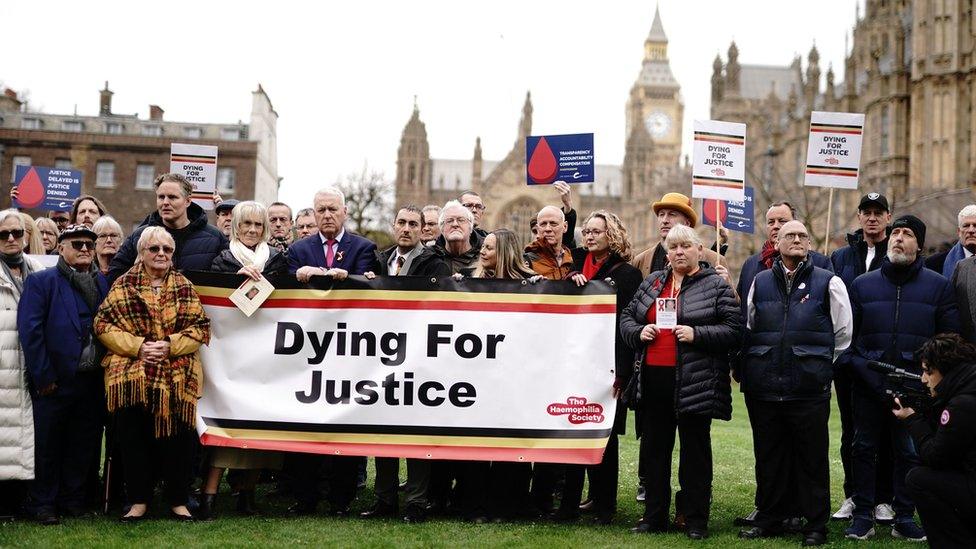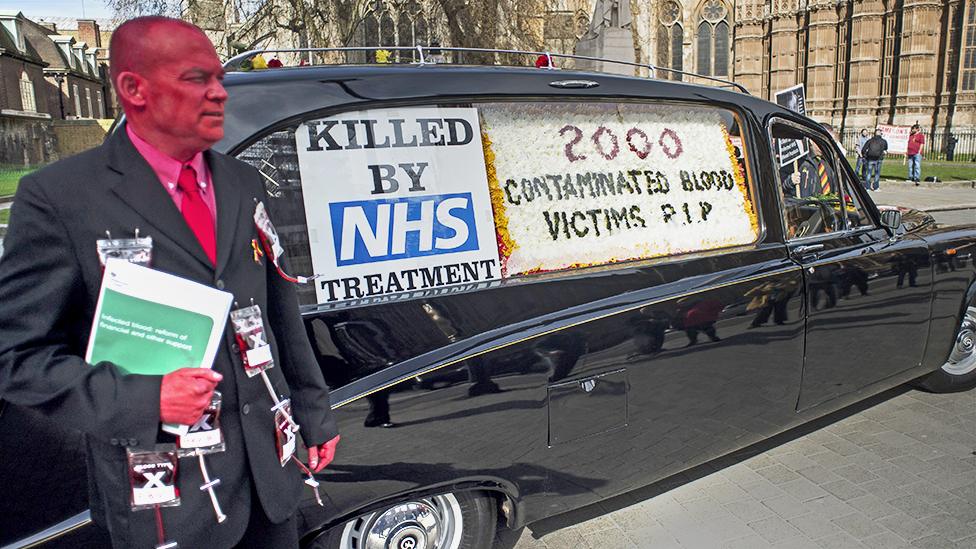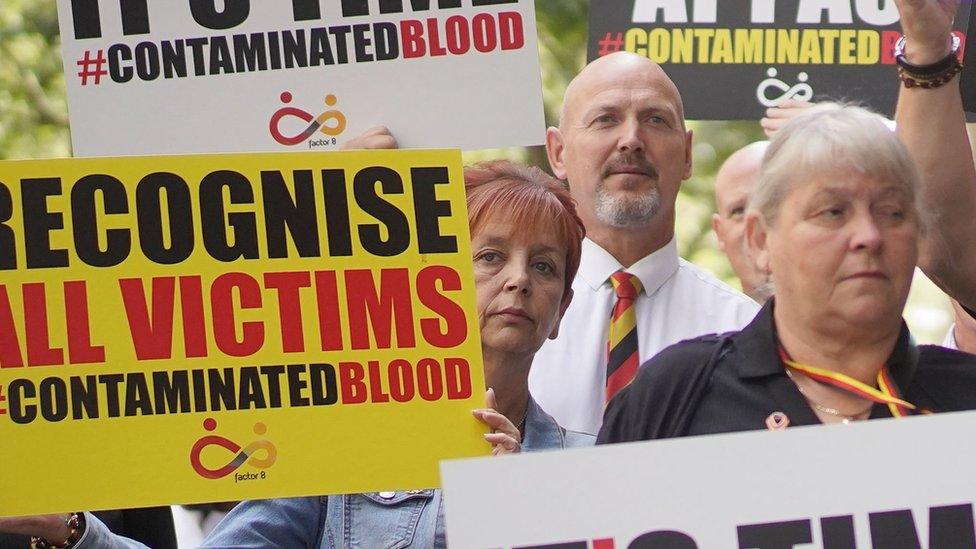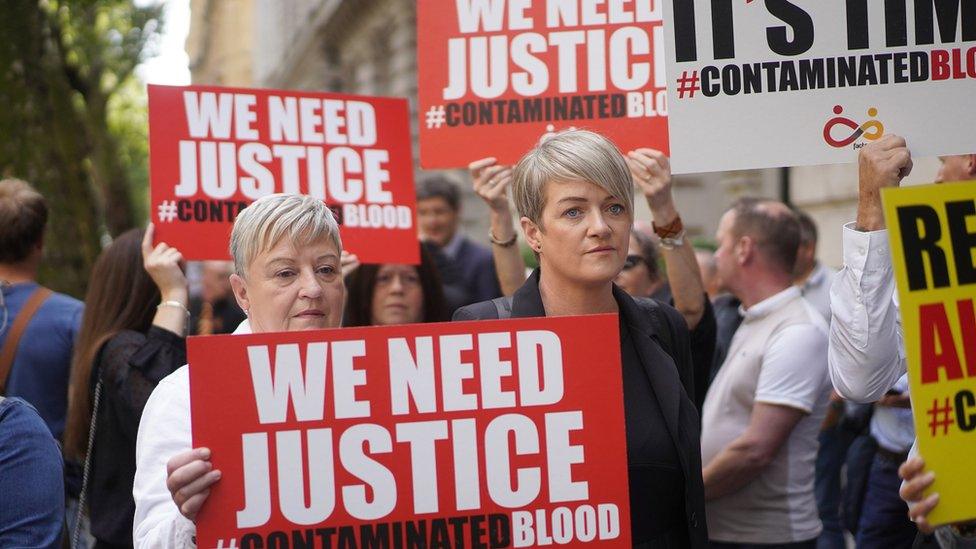Infected blood victims step up compensation battle
- Published

Victims of the contaminated blood scandal have urged the government to set out a compensation scheme, for those affected, in next week's Budget.
Campaigners staged a demonstration in Westminster, demanding urgent action.
The Infected Blood Inquiry made its final recommendations for compensation payments in April 2023.
During Prime Minister's Questions, Labour MP Dame Diana Johnson noted that 80 victims of the scandal had died in the nearly 11 months since then.
The Hull North MP, chairwoman of the Commons home affairs committee, challenged Rishi Sunak to explain to the protesters outside why ministers had failed to implement any of the inquiry's compensation recommendations.
The prime minister replied that he was "acutely aware of the strength of feeling on this issue and the suffering of all of those impacted by this dreadful scandal", adding that the government had accepted "the moral case for compensation".
On Monday, the government had committed itself in the Lords to bring forward amendments to the Victims and Prisoners Bill, with the aim of speeding up the compensation process, Mr Sunak said.
The government has been widely accused of dragging its feet over compensation and the prime minister was heckled when he appeared before the inquiry last year, pledging to pay compensation "as swiftly as possible".
Around 30,000 NHS patients are thought to have been infected with HIV and hepatitis C through contaminated blood products in the 1970s and 1980s. More than 3,000 have died.
The public inquiry, external, chaired by retired judge Sir Brian Langstaff, is due to publish its final report in May. But last year Sir Brian called for a final compensation framework to be set up by the end of 2023.
He also called for the payments to be extended to the parents and children of those infected, saying it was time to "recognise deaths which have so far gone unrecognised".
The government has made interim payments of £100,000 each to about 4,000 victims and some bereaved partners.
But ministers have argued they are not able to make a final decision on further payouts, which could total billions of pounds, until they have seen the inquiry's final findings.
Claire Dixon, whose mother Nora Worthington was infected with HIV through contaminated blood in 1991, said her mother urged her to keep up the fight for recognition of the victims' suffering before her death in 1993.
"Before she passed away she said: 'Please don't let them get away with it'," said 52-year-old Ms Dixon, from Manchester.
Speaking from College Green in Westminster, she said: "My mother was given three pints of blood for a perforated ulcer, one of the pints was infected with HIV.
"For me personally, it is about the recognition. It isn't about the money. No amount of money could ever bring my mother back."
'Sickening'
As a single parent, Mrs Worthington had yet to be recognised by the government for compensation, Ms Dixon said.
Sue Sparkes, from Cardiff, said her husband, Les, a haemophiliac who was infected with HIV and hepatitis C, died in 1990.
"I was left widowed at 31 with two young children," she said. "[The government] keep on saying they are waiting for the report, we don't need to wait for the report. They are trying their best not to pay. It's the worst tragedy in the history of the NHS."
A number of MPs joined the campaigners to support their calls for rapid compensation.
Labour leader Sir Keir Starmer met them in Westminster Hall, a room in Parliament used for debates. Asked if he would resolve delays in compensation if Labour came to power, he said "yes", but added he hoped the matter would be resolved before then.
Kate Burt, chief executive of the Haemophilia Society, said: "It is sickening and cruel that five decades after our community was exposed to the horror of the contaminated blood scandal, we are still waiting for government to right that wrong and take responsibility for what happened."
Rachel Halford, chief executive of the Hepatitis C Trust, added: "The government's refusal to act is actively harming these people, people whose lives have already been devastated by infected blood. They deserve better than this."
A government spokesperson said: "This was an appalling tragedy, and our thoughts remain with all those impacted. We are clear that justice needs to be delivered for the victims.
"This covers a set of extremely complex issues, and it is right we fully consider the needs of the community and the far-reaching impact that this scandal has had on their lives.
"The government intends to respond in full to Sir Brian's recommendations for wider compensation following the publication of the inquiry's final report."
- Published5 April 2023

- Published17 January 2024

- Published18 December 2023
